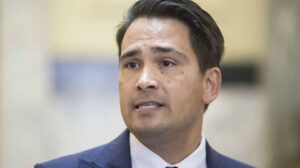For a while, I have been pondering why National and Act are not gaining more traction in recent polls, as Labour flounder from one disaster to another. As I have written previously, this Labour government is potentially one of the worst governments since Muldoon in the 1970s. It beggars’ belief that National cannot gain any ground on Labour in the polls. For those on the centre right, this is appearing to be an unsolvable conundrum.
I have read two articles as to why this may be the case. The first article is by Dr Bryce Edwards, a Political Analyst in Residence at Victoria University of Wellington. He is centre left, so his comments are more telling than one would expect coming from a left leaning commentator in referring to the plight of the true left, but paradoxically it also relates to the plight of the right too. The second article is by Peter Dunne, on the centre right, who writes perceptively about National’s plight and problems.
Dr Edwards wrote a piece entitled “How politics got captured by the middle class, and why it’s a problem” (Democracy Project, 8 September 2022). His article was not what I expected. However, it made me realise how the middle class has begun to control the narrative around where this country is headed, how it relates to the polls and potentially the results of the next election.
Dr Edwards outlines this as the increasingly powerful force in society – the Professional Managerial Class (PMC), who are prone “to see the majority of ordinary people as reactionary and culturally backward, racist, sexist and homophobic. The PMC see their political role as dispelling and combatting these views. They often regard change as something to achieve through individual actions – e.g., how we behave or policing how other people behave. This liberal approach is especially concerned with language, and clamping down on “wrong opinions” – which is not that surprising, because their day jobs of such individuals often involve “telling people what to do.”
Their role is one of a political agenda as being one of self-interest. After all, the reform programme reinforces “their own moral or public standing, while often remunerating them very highly”. Critics of the PMC class argue…” that these middle-class professionals consciously attempt to elevate members of historically oppressed communities – especially in terms of ethnicity, sexuality, and gender – into this more elite group, in the name of “diversity”. Critics allege that, this is a version of “co-option”, in which society’s elite becomes more demographically diverse, but the same old structures keeping the working class in their place remain unchanged.
“The socialist economist Thomas Piketty has been especially interested in the role of the PMC, and he talks about how you can basically differentiate left and right-wing factions of this new middle class – labels that he gives as the brahmin left” and “the merchant right”. Here in New Zealand, Max Rashbrooke has converted this into the labels of the “Kelburn Left” and the “Remuera Right” to denote these influential demographics.
“Traditionally the political left and its parties used to orientate entirely towards the working class and poor. Typically, the politicians of these parties were from trade union backgrounds and working-class occupations. And, perhaps more importantly, they pursued a working-class agenda (not just paying lip service to it like contemporary parties in Parliament). Of course, their voters were historically from the lower socio-economic half of society, and they tended to be less well-educated than voters of the political right.
“The left is now more liberal and elitist as a result. It’s not focused so much on the historic agenda of reducing economic inequality, or delivering improved housing, education, and so forth, but is more concerned with the interests of the PMC – particularly symbolism and moral panics. They would rather change the names of government agencies, or even the name of the country, than see political change that might endanger their own economic interests.
“Mclauchlan argues the PMC has created a great industry for itself in Wellington especially, becoming something of a political class. They have imitated and appropriated the language of progressive politics, but it is primarily a grift, to procure themselves jobs, wealth, and power – especially from the state. He says, “It’s almost as if the primary role of the administrative state is shifting from serving the people to the redistribution of wealth to the staffers, lawyers, PR companies, managers and consultancy firms that work in them, or for them.”
“We now have a highly dysfunctional situation according to Mclauchlan, in which the state has been captured by this liberal middle class elite. And because they are more interested in “communication” than delivery of reforms, not much actually gets done under the current government. He complains that Jacinda Ardern’s administration, and its public service is more interested in symbols than their constituents: “Previous Labour governments’-built schools, hospitals, public transportation networks, entire suburbs. Why can’t they?” To Mclauchlan, they’re just not interested. Their own material interests aren’t about serving the public, but in just building more bureaucracy.”
As such, the Kelburn Left have no desire to change the status quo or help the poor. Hence, it is in their interest to control the narrative to keep them in power, and by extension, Labour. As an ex-client, who recruited staff for the government told me, that even though she supported National, it was not in her financial interest to vote for them, but to vote instead for Labour, as Labour lined her pockets.
It is also not in the interest of some media outlets to promote or support a true left-wing view, or a right-wing view. Mainly because neither the working class would support them financially, or their virtue signalling positions, and nor would the right-wing fund them either.
Hence, the middle ground has been captured by a vested interest group, now known as the Professional Managerial Class (PMC). Thus, any move to the right has become more problematic because this class is denying both the working class and the right a voice in how the country is being run. It is a strange and weird paradox for both the true left and the conservative right.
This follows to how, in Peter Dunne’s view, the right, via National, have a major problem of regaining power. Research shows that the “right track/wrong track” is a clearer indicator of voter thinking than the first past the post analysis. Yet, as Peter Dunne highlights, National and ACT have been unable to take advantage of this trend.
The worry for National is its “own mounting failure to capitalise on rising voter disillusionment. Although an increasing majority in the polls does not like the way the country is heading, they do not yet see, nor have sufficient confidence, that National, with ACT in tow, is a credible alternative. National is still at least 5-8% short of where it should be rating about now. With more and more people expressing unease about Labour’s direction, the National/ACT bloc ought to be enjoying a clear and increasing opinion poll lead, rather than being either just short of a majority or just over the bar, as at present”. (Peter Dunne, 6 September 2022)
Dunne also states “There has been no end of opportunities for National to take advantage of issues such as the economy’s decline, post Covid19 uncertainty affecting public confidence, any benefit from the recent health reforms a long way off, come readily to mind. Add to that the government’s increasingly unpredictable decision-making, alongside more visceral issues like Three Waters, and National’s opportunities are endless. But it seems almost incapable of taking advantage of them”.
To overcome its problems National “needs to be developing a concise, almost dispassionate, narrative on the areas in which the country is heading in the wrong direction, and the broad sorts of steps needed to correct that. Over the next few months, it should be judging every action of the government against that narrative, and then, early next year, producing the specific policies to change things”.
Unfortunately, “National’s reaction is still too kneejerk, often opposing for the sake of opposing, rather than hinting how things could become better if they were restored to power next year”.
Peter Dunne is right when he concludes that “National needs to become the party of optimism and hope, not remain as the gloom merchant it is at present. With most people already having concluded for themselves things are not moving in the direction they want; they do not need National constantly reminding them of that. That current mode of criticism offers little that is new and paints National as part of the problem, the same way Labour is”.
Thus, National are potentially missing some critical opportunities as well as not being decisive or positive enough on matters that concern most people in the centre, whether on the margins of the centre left or right. Coupled with this is how the Kelburn Left, ala the Professional Managerial Class, have stolen the middle ground from both the centre left and centre right and pushed the true left to the margins of the fringe left. While concurrently stealing the centre right from National, thus reducing their voter base, and by extension, extending Labour’s base. For National and ACT to succeed, they need to reduce the influence of the Kelburn Left, by being more optimistic and equally, challenging the power and virtue signalling of the Professional Managerial Class. The consequences of not doing this are of course potentially disastrous for the country as the self-serving, woke virtue signalling Kelburn Left, will have to play ball with the hard core left Green Party and the Māori Party in years to come. That of course will have ramifications for the right, who could find themselves excluded perpetually from power, or for some time to come.

